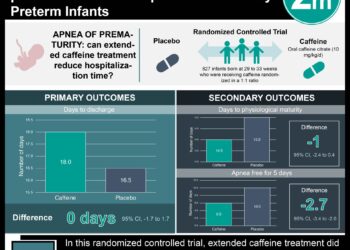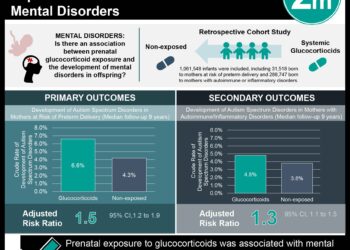Trends in morbidity and mortality of extremely preterm infants in the United States
1. Among extremely preterm infants born at 22-28 weeks’ gestational age in 2013-2018 in the United States, 78.3% of infants survived to discharge, a significant improvement from 76.0% in 2008-2012.
2. Among infants born at less than 27 weeks’ gestational age, rehospitalization and severe neurodevelopmental impairment were common at 2-year follow-up.
Evidence Rating Level: 2 (Good)
Study Rundown: Although modern practices and treatment guidelines have greatly reduced mortality and morbidity in extremely preterm infants, on-going review of neonatal outcomes is needed to develop care strategies, guide interventions, and ultimately improve survival and quality of life outcomes. This observational study evaluated mortality, in-hospital morbidities, care practices, and neurodevelopmental and functional outcomes at 22-26 months’ corrected age for extremely preterm infants born in the United States between 2013 and 2018. The main outcomes were survival and in-hospital morbidities including necrotizing enterocolitis, infection, intracranial hemorrhage, retinopathy of prematurity, and bronchopulmonary dysplasia. At 2-year follow-up, infants were assessed for health and functional outcomes including neurodevelopment, cerebral palsy, vision, hearing, rehospitalizations, and need for assistive devices. Data was compared to a similar cohort of preterm infants from 2008-2012. Among 10877 extremely preterm infants born in 2013-2018, 78.3% of infants survived to discharge, a significant improvement from 76.0% in 2008-2012. Among infants who survived to their 2-year follow-up, 49.9% had been rehospitalized and severe neurodevelopmental impairment occurred in 21.2%. A limitation of this study was that although the Neonatal Research Network cohort included a large and diverse sample size, it is an academic hospital-based database and thus, does not represent the sociodemographics of the entire US preterm population.
Click to read the study in JAMA
Click to read an accompanying editorial in JAMA
Relevant Reading: Trends in care practices, morbidity, and mortality of extremely preterm neonates, 1993-2012
In-Depth [prospective cohort]: This study included 10877 infants (49.0% female) born at 22-28 weeks’ gestational age between January 2013 and December 2018, including 2566 infants who completed follow-up at 2 years’ corrected age. Data was collected from a registry for extremely preterm infants born at 19 US centers and compared to a similar cohort of infants from 2008-2012. Overall, 78.3% of infants survived to discharge (from 76.0% in 2008-2012; adjusted difference, 2.0%; 95%CI, 1.0%-2.9%). The incidence of all in-hospital morbidities were more likely in extremely preterm infants, including necrotizing enterocolitis (8.9%), early-onset infection (2.4%), late-onset infection (19.9%), intracranial hemorrhage (14.3%), retinopathy of prematurity (12.8%), and bronchopulmonary dysplasia (8.0%). Among 2566 infants evaluated at 2-year follow-up, 8.4% had cerebral palsy, 1.5% had bilateral blindness, 2.5% required hearing aids or cochlear implants, 49.9% had been rehospitalized, and 15.4% required mobility aids or other supportive devices. Lastly, in 2458 fully evaluated infants, 48.7% had no or mild neurodevelopmental impairment, 29.3% had moderate neurodevelopmental impairment, and 21.2% had severe neurodevelopmental impairment.
Image: PD
©2022 2 Minute Medicine, Inc. All rights reserved. No works may be reproduced without expressed written consent from 2 Minute Medicine, Inc. Inquire about licensing here. No article should be construed as medical advice and is not intended as such by the authors or by 2 Minute Medicine, Inc.







